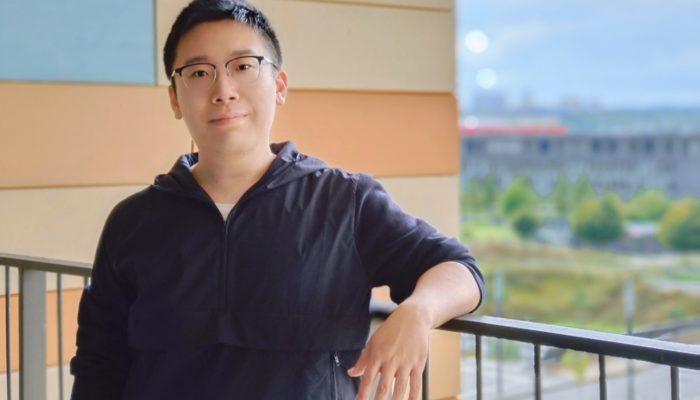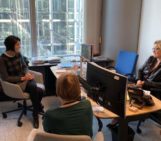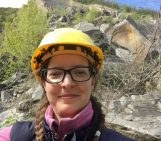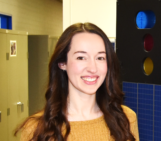
Hi Mengze, thank you for spending your time with us today. Could you tell our readers a little about yourself?
Hi Simon, thanks for the interview today. I’m happy to tell more about myself.
I was born in China, lived and studied there until I finished my Bachelor’s study. After that I went to Germany for Master’s and doctoral degrees. Last year I have finished my PhD at Max Planck Institute for Chemistry and stayed there as a postdoctoral researcher until now. My research is about measuring chemical compounds (e.g. greenhouse gases, volatile organic compounds) in the Earth’s atmosphere as well as from humans, quantifying their emissions, and assessing their impacts on the climate. I have been to Portugal and Denmark for field measurement campaigns; it was really fun. From next month, I will start my new postdoc career at University of Michigan-Ann Arbor in the US. In the meanwhile, I’m serving as Early Career Scientist (ECS) representative and blog editor for the EGU Atmospheric Sciences Division since 2020.
The Atmospheric Sciences Division (AS) is one of EGU’s largest divisions, encompassing a broad range of processes and phenomena. Your own research focuses on atmospheric chemistry, including identifying the presence and emission of chemical elements. Can you provide some insight into the research conducted under the Atmospheric Sciences Division, including you own?
Yes sure. Atmospheric sciences encompass all the chemical, physical, and dynamical processes that occur in the atmosphere, and their interactions with other systems, such as the biosphere, cryosphere, and hydrosphere. Some examples of atmospheric sciences related topics are global atmospheric chemistry (ozone, greenhouse gases, etc.), particles and clouds, wildfires, extreme weather events, and climate policy (e.g. recently released IPCC report, Paris Agreement). These topics normally have impacts on a large number of population.
Some of my research topics are the global emissions and trends of greenhouse gases and volatile organic compounds in the atmosphere. Many of these chemical compounds are emitted into the atmosphere from human activities and cause global warming. Some compounds with high global warming potential could stay in the atmosphere for long time, e.g. the lifetime of methane (CH4) is about 10 years, CFC-11 about 50 years, nitrous oxide (N2O) ~100 years, and sulfur hexafluoride (SF6) ~800 years. That means, even if we stopped emitting any of these compounds right now, their effects on global warming will last over decades or centuries. This is why we must take actions very fast and early in order to slow down global warming. If you are interested in my research, you may follow me on Google Scholar.
This year the International Day of Clean Air for Blue Skies was on September 7th and had the theme “Healthy Air, Healthy Planet”, which focused on the health impacts of air pollution. From your position as an atmospheric chemist, is there a key message – or myth you’d like to bust – about how we relate to the atmosphere?
We, humans, are closely bound up with air pollution. A huge amounts of air pollutants are produced by us in many ways, such as from industries, transportation (cars, trains, etc.), power plants, and agriculture. In return, air pollution causes a number of diseases on humans. The WHO (World Health Organization) estimated that each year 7 million people worldwide die from air pollution. Solely outdoor PM2.5 leads to 3.3 million deaths worldwide per year (Lelieveld et al., 2015). Due to global atmospheric transport, air pollutants emitted from one point could be transported to the other side of the world, and thus have health impacts on people living there. Therefore, it is a joint effort, from everyone and every country, to reduce air pollution and its negative health impacts.
You’re the Early Career Scientist (ECS) Representative for the Atmospheric Sciences Division. What type of projects do you undertake as an ECS Rep?
About 40-50% of the Atmospheric Sciences Division members are ECS, they are the future of atmospheric science research. Therefore my role as an ECS rep is not only about providing science information to ECS or encouraging them to participate in science events, but also uniting them together and raising their voice to the science community, helping with their career, and taking care of their mental and physical health.
There is a broad coverage of activities that our ECS outreach team undertakes with huge support from Thanos, our division president. Firstly, we frequently advertise atmospheric science related events or knowledge on our social media accounts, such as Twitter and Facebook. We also invite guest authors to contribute science and career blogs for our division’s blog website. We find that social media are good channels to connect with ECS and understand their needs. Secondly, based on the feedbacks from ECS, we organize networking events or webinars with specific topics. Once we have hosted an EGU wide webinar to raise the awareness of discrimination issues in geoscience and to discuss how geoscience communities can be more inclusive. We have also organized another two networking events, one was about how to publish and find a career at Nature Research (the speaker Dr. Heike Langenberg, chief editor of Communications Earth & Environment), the other one focused on ECS mental health issues. We have co-hosted some events for the 2021 online conference on remote sensing in Svalbard together with EGU Cryospheric Sciences and Ocean Sciences divisions.
Finally, what are you looking forward to in the future?
Our next major focus will be combating science bullying. A surprisingly large fraction of PhD students (>10%) experienced bullying from a superior, according to survey reports from PhD networks of Max Planck Society and Helmholtz Association in Germany. But very rare that one (victim, ECS) takes actions. Why? Compared to senior scientists, ECS are under-represented and weak in defending and protecting themselves. They often suffer more from the consequences of taking actions to fight for their legal rights. What can we do then? I can not give you a perfect answer yet, but for sure it is not being silent. Please contact us if you have any thoughts on this or experience to share (anonymously).
As you see, the projects we do are driven by what ECS need. Here I’d like to invite every ECS to get connected with us and let us know what you need. We are very happy to hear from you.
Thanks again Simon for today’s interview. Have a nice day!
Interview by Committee Programmes Co-ordinator Simon Clark.




